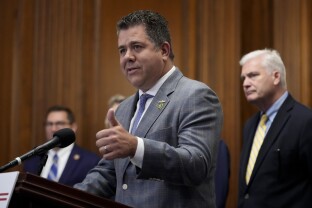House Republicans want the Biden-era program cutting internet costs for low-income families to end. And nearly a dozen of those same House Republicans wouldn’t mind if the program was also extended.
Nineteen House Republicans have co-sponsored Democratic Rep. Yvette Clarke’s bill to provide funding to the Affordable Connectivity Program, a key component of President Joe Biden’s 2021 infrastructure law that grants $30 to $75 discounts on monthly internet bills. Of the 19 Republicans, 11 are also members of the Republican Study Committee, the conservative House group comprising roughly 80% of the GOP conference, calling for the ACP to end.
The program runs out of funds on Tuesday, leaving roughly 23 million low-income American families in the lurch on their internet bills. Despite some bipartisan support for the program, Republican lawmakers haven’t been too pressed to pass more money for it. However, several have called on their leadership to take up the issue.
The RSC’s 2025 legislative agenda includes a plan to eliminate the benefit entirely. The group claims that “80% of ACP beneficiaries had high-speed internet before receiving the subsidy” and that private industry “captures some of the benefits while passing on higher prices to all consumers.”
Just two weeks ago, RSC members Reps. Brandon Williams, Nicole Malliotakis, Nick LaLota, and Tony Gonzalez signed onto a letter to Speaker Mike Johnson — another RSC member — expressing concern about the program’s funding lapsing.
“As the government and broadband infrastructure providers begin to wind down the ACP, we foresee adverse effects on families within our districts and statewide as they contend with escalating internet expenses,” the members wrote, urging congressional action to fund the benefit.
LaLota, whose district is being targeted by the Democratic Congressional Campaign Committee, told NOTUS that securing funding was important for his district, but when asked about the discrepancy between his position and that of the RSC, which represents most House Republicans, he said he had not “thought much about that.”
Malliotakis said she simply disagrees with the conservative group, calling for a bipartisan extension of the program.
“I was a sponsor of the bill, but I do not approve of that,” she said of the RSC’s plan to end the program. “There’s a lot of things they do that I don’t necessarily support … I would like to see the program extended because a lot of my constituents rely on it for internet access.”
New Jersey Republican and RSC member Rep. Jeff Van Drew said the ACP is a “unique” case where the government is more efficient at correcting the market than the private sector. He noted that he’s had “debates and arguments” with his Republican colleagues over the program.
“I’m obviously conservative, but I’m also a populist,” Van Drew said of supporting additional funding for the program. “Every single rule in life, there are exceptions. And this is one of those exceptions.”
Sign up for the latest from NOTUS.
A December survey from the Federal Communications Commission, which runs the ACP, found that over three-quarters of respondents say losing their ACP help would disrupt their service by making them change their plan or drop internet service entirely.
Democrats have been calling on Johnson and Senate Minority Leader Mitch McConnell to work with them on an extension to the program. Clarke led a bipartisan letter to the House and Senate leaders in late March calling for immediate action, though neither chamber has shown urgency. A DCCC spokesperson told NOTUS that the GOP’s stated concern about ACP’s funds running out has “thus far has been all talk, no action.”
New York Rep. Marc Molinaro, who is not in the RSC, said the bill’s Republican co-sponsors are trying to convince more members of their party to support funding the program.
“Every one of our individual ‘families’ have their perspectives,” Molinaro, whose district is also a Democratic target, said. “I know the value of the program, and many do, so their view was taken into consideration, but ultimately, I’m hopeful we can extend the program.”
These calls from within the Republican Party haven’t swayed RSC Chair Rep. Kevin Hern, who cited the national debt in his rationale for wanting the program cut completely.
“We’re trying to find ways to get our spending under control; we’ve got to find ways,” Hern said. “We have to find those margins, so we put that in there. Obviously, there’ll be some conversation around that. We realize that, but that’s part of where we’re at.”
On whether he’s trying to convince his ACP-supporting Republican colleagues in the RSC, Hern said he hasn’t talked to them.
“I’m sure they’ll talk to me,” Hern said.
—
Oriana González is a reporter at NOTUS. Calen Razor is a NOTUS reporter and an Allbritton Journalism Institute fellow.
Sign in
Log into your free account with your email. Don’t have one?
Check your email for a one-time code.
We sent a 4-digit code to . Enter the pin to confirm your account.
New code will be available in 1:00
Let’s try this again.
We encountered an error with the passcode sent to . Please reenter your email.


